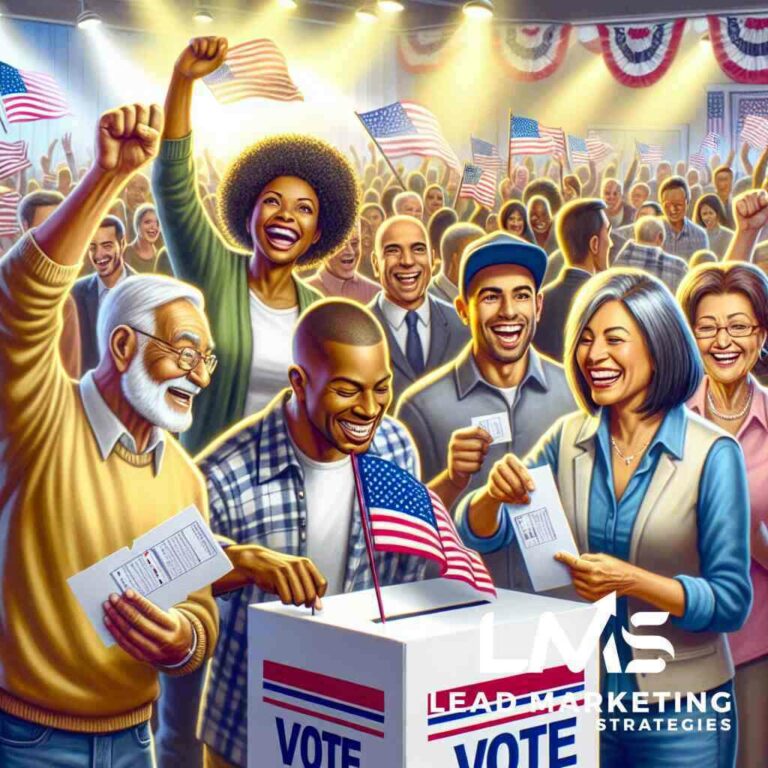Decoding the Impact of Social Media in Political Campaigns
Historical Evolution and Contemporary Trends
Since its inception, social media has radically transformed how political campaigns are conducted. Initially, platforms served as mere communication tools, but their role has expanded to encompass comprehensive political marketing services. This evolution has coincided with advancements in technology, enabling campaigns to leverage digital political campaigning strategies effectively. These strategies have grown increasingly sophisticated, integrating data analytics to tailor messages to specific voter segments. Moreover, the ubiquitous nature of these platforms has democratized political participation, allowing even minor parties to gain traction without traditional media gatekeeping. This shift represents a significant departure from past political dynamics where media conglomerates predominantly shaped public opinion.
The Symbiotic Relationship between Social Media and Political Expression
The intersection of social media and political expression has created a symbiotic relationship deeply affecting political engagement on digital platforms. Candidates and politicians have mastered the art of using these platforms to directly connect with their constituencies, bypassing traditional media intermediaries. This direct line of communication fosters a more personal connection, enhancing voter interaction online. As politicians craft their online personas, they influence public discourse, shaping how issues are perceived and discussed. This development has empowered both seasoned politicians and newcomers, giving them a powerful tool to articulate their political visions and rally support. Social media has thus become an indispensable asset in modern political arsenals, transforming how narratives are constructed and communicated.
Impact on Political Narratives: Redefining Storytelling
Social media’s impact extends to the fundamental way political narratives are developed and disseminated. Platforms like Twitter and Facebook enable real-time storytelling, allowing campaigns to adapt rapidly to current events and voter sentiment. This agility is crucial for maintaining a relevant political social media presence impact. Hashtags, memes, and viral content have become powerful elements in political storytelling, serving as simple yet compelling tools for conveying complex messages. These mechanisms engage voters on emotional and intellectual levels, effectively shifting passive observers into active participants in political discourse. By redefining how stories are told, social media has not only changed the methods of persuasion but also shaped the very architecture of contemporary political communication.
Strategies for Harnessing Social Media’s Political Potential
Crafting Compelling Political Narratives through Digital Platforms
In the realm of digital political campaigning, crafting compelling narratives is paramount. Social media platforms offer politicians a unique opportunity to tell their stories in innovative ways, bypassing traditional media channels. By developing a politician’s social media strategy, campaigns can reach a wider audience with well-tailored messages that resonate on an emotional level. These digital platforms are not just about broadcasting; they are about creating dialogues that foster deeper connections with the electorate. Personal anecdotes, behind-the-scenes glimpses, and interactive content are all part of a successful narrative strategy, transforming voters from passive recipients into active participants.
Moreover, social media’s agility allows for real-time adaptations to political discourse as circumstances change. It’s not only about conveying a message but also about receiving and acting upon voter feedback, making the entire process more dynamic. Harnessing the power of social media for political narratives requires an understanding of the platform’s intricacies and a strategic approach that emphasizes emotional engagement and relatable storytelling.
Voter Engagement Online: From Passive Browsers to Active Participants
Transforming voter engagement online from passive browsing to active participation is a significant objective of modern political campaigns. In this digital age, social media platforms serve as interactive hubs where voters can engage directly with politicians and their campaigns. Effective voter interaction online relies on creating captivating content that encourages participation, such as polls, Q&A sessions, and live discussions.
Social media also provides tools for personalized voter outreach, making it easier to tailor messages to specific audiences, thereby increasing the likelihood of engagement. The use of electoral analytics can further refine these strategies, identifying trends and preferences that influence voter behavior. This interactive engagement not only informs voters but also empowers them, creating a two-way communication channel that is essential for fostering trust and building a loyal supporter base.
Hashtag Political Movements: Mobilizing and Inspiring Action
Hashtags have evolved into powerful tools for mobilizing political movements and inspiring voter action online. Through strategic use of political hashtag movements, campaigns can create cohesive, memorable slogans that resonate across social media platforms and beyond, effectively amplifying their messages. These movements harness collective energy and focus it on specific issues or events, rallying supporters and increasing visibility.
Moreover, hashtags serve as organizing principles around which like-minded individuals can unite, discuss, and coordinate actions. They facilitate the virality of political messages, allowing them to reach global audiences with unprecedented speed and efficiency. Political movements driven by hashtags can lead to tangible real-world outcomes, whether it’s increased voter registration, participation in rallies, or policy changes.
For any campaign aspiring to achieve a significant political social media presence impact, leveraging hashtags effectively is crucial. It requires understanding the emotional and social underpinnings of digital grassroots political movements and tailoring messages that inspire and mobilize. By doing so, campaigns turn digital support into a powerful force for real world action.

Analyzing and Measuring Social Media’s Electoral Influence
Decoding Social Media Metrics: A New Age Electoral Tool
In the landscape of digital political campaigning strategies, social media metrics have emerged as invaluable tools for electoral analysis. Gone are the days when campaign success was gauged solely through physical rallies and TV ratings. Today, real-time data from platforms such as Twitter, Facebook, and Instagram is dissected to gauge public sentiment and engagement. This process involves ian n-depth analysis of likes, shares, comments, and the reach of political content. By harnessing these metrics, campaigns can effectively tailor their strategies to enhance their political campaign digital footprint and refine their voter engagement techniques.
Furthermore, sophisticated algorithms analyze demographics and behavior patterns, offering insights that drive more informed decision-making. These tools enable campaigns to track their reach, optimize content delivery, and adjust their messages to suit diverse audiences. In doing so, campaigners can maximize the potential of their digital outreach efforts, ensuring that resources are efficiently aligned with campaign goals.
Influence of Political Hashtag Trends on Voter Perception
Political hashtags have transcended their role as simple social media tools to become formidable elements in shaping voter perception and political social media presence impact. Hashtags provide a streamlined way of categorizing conversations, allowing like-minded voters to congregate and share ideas. They transform fragmented discussions into cohesive narratives that resonate with broader audiences, often influencing voter sentiment across diverse social strata.
For instance, catchphrases like #VoteForChange or #PoliticalReform can galvanize supporters and sway undecided voters. These trends become rallying points that not only convey campaign messages but also enable real-time interaction between voters and political candidates. By analyzing the reach and depth of these hashtags, campaigns can assess public opinion, adjust their messaging tactics, and ensure that their narratives remain compelling and relevant.
Electoral Social Media Impact: Real-time Analysis and Adaptations
Incorporating real-time analysis into electoral strategies allows campaigns to maintain a dynamic social media presence. As events unfold, the ability to quickly adjust strategies based on live feedback becomes imperative. Electoral campaigns need to be agile, swiftly interpreting data and adapting to maintain a resonance with their audiences. This is where tools for assessing electoral social media outreach become crucial.
Social media platforms provide the agility required to adapt to unexpected circumstances, such as breaking news or sudden shifts in voter sentiment. With these tools, campaigns can manage crises and capitalize on opportunities with timely content adjustments. Insightful analysis of voter behavior empowers campaigns to refine their strategies, target their electoral messages more precisely, and ultimately enhance their political marketing services. As campaigns adapt, they not only stay relevant but also leverage real-time data to foster meaningful connections with voters. For more information, explore digital grassroots political movements and how they harness social media’s power to create impactful political change.
Navigating Ethical Terrain and Digital Challenges
Addressing Misinformation and Its Ripple Effects
In the world of digital political discourse, misinformation poses a profound challenge, impacting political campaigns and voter perceptions. Misleading content spreads rapidly across social media platforms, often outpacing efforts to correct it. This phenomenon can fragment public opinion, leading to confusion and potentially swaying electoral outcomes based on false narratives. Political campaigns must implement robust strategies to counter misinformation, utilizing fact-checking teams and digital tools to maintain credibility. Furthermore, educating voters about the dangers and identifying markers of misinformation is critical in empowering them to discern truth from fabricated stories. Engaging in transparent communication fosters trust, a vital element for any political entity aspiring to fortify its political social media strategy.
Countering misinformation is not a solo endeavor; it necessitates partnerships with tech companies and thought leaders to create a unified front. Strategies should encompass real-time monitoring of digital platforms, enabling campaigns to act swiftly when inaccuracies arise. Instituting these measures safeguards the integrity of political narratives and ensures that the public discourse remains rooted in verified information. Consequently, political entities can bolster their credibility, effectively engaging constituents and safeguarding their electoral social media outreach efforts.
Balancing Digital Advocacy with Ethical Responsibility
While leveraging digital platforms enhances political engagement on digital platforms, maintaining ethical responsibility is paramount. Political campaigns must navigate these waters by advocating positively without resorting to manipulative tactics. Ethical political marketing strategies prioritize genuine voter interaction, transparency, and respect for voter data privacy. Ensuring these principles are upheld fosters trust, leading to more sustainable engagement with the electorate.
Campaigns should establish ethical guidelines that delineate acceptable social media practices, emphasizing the need for honesty in messaging and restraint from exploiting voter vulnerabilities. By instituting these ethical frameworks, campaigns solidify their reputations as trustworthy entities capable of meaningful digital advocacy. Upholding these standards makes political entities more appealing to voters who value integrity and accountability, enhancing their overall political social media presence.
Moreover, encouraging open dialogues with constituents and stakeholders can further strengthen ethical commitment. By fostering an environment where ideas and concerns are shared transparently, campaigns can maintain relevance and advocate effectively while staying true to ethical principles.
Preparing for Cyber Threats in Political Campaigns
The evolution of social media as a core component of political strategy brings with it an increased risk of cyber threats. Political campaigns must prioritize cyber resilience to safeguard their digital political campaigning strategies. Implementing robust cybersecurity measures is not just an optional safeguard but an indispensable necessity to protect sensitive campaign information. From securing communication channels to protecting voter databases, cybersecurity should be an integrated component of campaign infrastructure.
Developing a proactive cybersecurity strategy entails regular vulnerability assessments and deploying advanced threat detection systems to identify and counteract potential breaches swiftly. Furthermore, training campaign teams on recognizing and responding to cyber threats enhances overall security preparedness. By being vigilant about potential cyber threats, political campaigns can ensure continuity in their digital operations and protect their political content marketing.
In addition to technical measures, campaigns should also focus on collaboration with cybersecurity experts and technology partners. Establishing these alliances provides campaigns with access to cutting-edge tools and intelligence, fortifying their defenses against cyber adversaries. This holistic approach to cybersecurity empowers political campaigns to maintain operational integrity, thereby safeguarding their reputation and maximizing their electoral impact.

Conclusion: The Future Canvas of Political Engagement
Evolving Landscape of Social Media Political Mobilization
As we look ahead, the landscape of social media political mobilization continues to transform, offering dynamic avenues for engaging voters. Political campaigns are increasingly leveraging platforms to create potent digital movements that transcend geographical boundaries. This involves not just narrating compelling stories but also organizing grassroots initiatives that harness the power of collective action. Politicians keen on shaping meaningful encounters must understand how the impact of voting on social media can direct the course of modern electoral processes. By capitalizing on social media’s capacity to foster communities, campaigns can enhance their resonance, ensuring messages cut through the noise and reach the intended public effectively.
Moreover, as social media evolves, its algorithms become more sophisticated, enabling more precise targeting of voter segments. Campaigns must continuously adapt to these changes, refining their tactics to maximize engagement. By doing so, political entities can maintain a robust presence, turning digital dialogues into actionable outcomes that resonate with the electorate.
Futuristic Avenues for Campaign Digital Footprint Enhancement
The future of political campaigning will be profoundly influenced by advancements in digital technologies. Campaigns aiming to enhance their political campaign digital footprint must explore futuristic avenues that encompass cutting-edge tools and innovative strategies. From AI-driven analytics that offer insights into voter behavior to immersive virtual reality experiences that bring political narratives to life, the possibilities are boundless. Campaigns that embrace these innovations can expect to establish a formidable presence, capturing the attention of diverse voter demographics.
Investing in digital infrastructure will empower campaigns to reach audiences more effectively, cementing their relevance in a rapidly changing political environment. As emerging technologies continue to redefine digital footprints, political entities can leverage them to not only disseminate messages but also to foster meaningful connections with voters, paving the way for long-term engagement.
Charting the Road Ahead: Principles for Successful Digital Political Engagement
Charting the road ahead in the digital political arena requires adherence to principles that prioritize authenticity, inclusivity, and adaptability. Successful digital political engagement is rooted in a genuine understanding of voter needs and desires, achieved through meticulous analysis of audience data. Crafting messages that resonate on both emotional and rational levels ensures campaigns not only capture attention but sustain it over time.
Furthermore, collaboration with digital experts, like those at Lead Marketing Strategies in Commack, NY, provides campaigns with the resources and expertise needed to refine their strategies. By embracing adaptive campaign structures that respond to real-time feedback and shifts in public sentiment, political entities can remain agile, ensuring their digital efforts translate into tangible results.
Ultimately, by embracing these principles, campaigns can navigate the complexities of modern digital landscapes, fostering a profound impact on the political engagement process. With a steadfast commitment to innovation and ethical practices, the future of digital political campaigning holds the potential to revolutionize how political dialogue is conducted and perceived.
Frequently Asked Questions
Question: How do Political Marketing Strategies utilize social media political influence to enhance campaign success?
Answer: Political Marketing Strategies harnesses social media’s political influence to craft compelling narratives that resonate with voters, fostering online voter persuasion and engagement. By employing advanced campaign digital marketing techniques, we tailor each social media strategy to align with specific electoral goals. Our team uses social media election analytics to monitor and adapt campaigns in real time, ensuring that your political digital engagement remains effective and relevant. This approach guarantees a robust political social media presence, ultimately enhancing your campaign’s digital footprint.
Question: What strategies does Political Marketing Strategies recommend for orchestrating successful hashtag political movements?
Answer: At Political Marketing Strategies, we advocate leveraging social media platforms to create impactful hashtag political movements. By crafting strategic hashtags that engage voter sentiment and reflect campaign messages, we can amplify your social media political mobilization efforts. Our political influencer marketing techniques further extend the reach of these movements, turning digital grassroots movements into powerful tools for voter engagement online. By analyzing political hashtag trends, we continuously refine our strategies to ensure your campaign’s messages reach the right audiences effectively.
Question: How do Political Marketing Strategies ensure effective voter engagement online through social media platforms?
Answer: Political Marketing Strategies employs a comprehensive approach to boost voter engagement online. We develop interactive content and employ dynamic social media campaigning tactics designed to convert passive browsers into active participants. Utilizing electoral analytics, we personalize engagement efforts, tailoring messages that resonate with different voter segments. This ensures a targeted political social media outreach that builds meaningful connections and fosters a loyal supporter base. Our candidate’s web design and online voter persuasion strategies also contribute to this vibrant digital engagement.
Question: How do you address misinformation challenges in digital political discourse as outlined in the Ultimate Guide to Social Media’s Political Impact?
Answer: Political Marketing Strategies is committed to maintaining the integrity of digital political discourse by implementing robust strategies to combat misinformation. Our approach includes assembling dedicated fact-checking teams and leveraging digital tools to swiftly identify and correct misleading content. By fostering transparent communication and ethical responsibility in political marketing solutions, we build trust with your constituents. Our partnerships with tech companies and continuous monitoring of political narratives online further ensure that your campaign’s message remains credible and impactful.
Question: What measures does Political Marketing Strategies take to protect against cyber threats in political campaigns?
Answer: To safeguard digital political campaigning, Political Marketing Strategies prioritizes cybersecurity for all campaign-related activities. We implement advanced cyber resilience strategies, including regular vulnerability assessments and the deployment of cutting-edge threat detection systems. Additionally, our training programs empower campaign teams to recognize and respond to potential cyber threats effectively. Our collaboration with cybersecurity experts ensures that your campaign’s sensitive data remains secure, maintaining your campaign’s integrity and enhancing its electoral impact.




